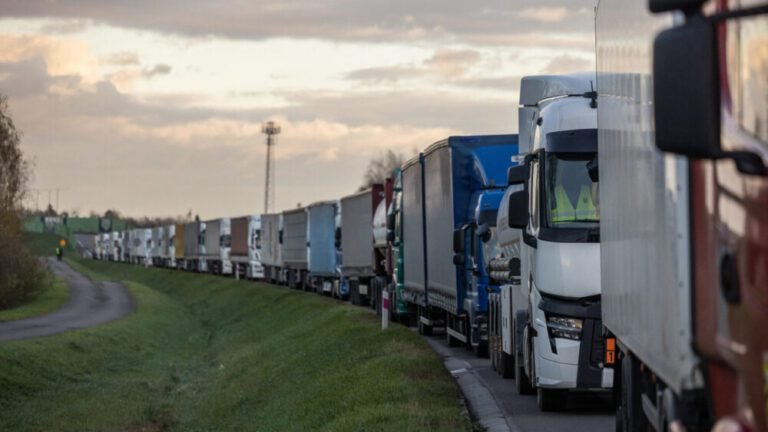The European Union appears to be in no hurry to resolve the plight of Polish truck drivers who say they have had to endure unfair competition from Ukraine for more than a year. Protesters say measures that were supposed to help support the Ukrainian economy during the war are now hurting local Polish companies.
Truck drivers began closing three major border crossings with Ukraine on Monday, November 6, allowing only passenger traffic and the transport of humanitarian or military aid. They intend to maintain the blockade until January 6 if their demands are not met by then.
After the Russian invasion of Ukraine last February, the European Union and Ukraine reached an agreement to allow Ukrainian trucks to enter the European Union without entry permits. This resulted in Ukrainian trucks crossing the Polish border about 900,000 times, compared to 180,000 trucks per year before the war. Polish trucking companies are demanding restrictions on the number of Ukrainian-registered trucks entering Poland and a ban on transport companies with capital outside the EU.
The agreement, which was signed last June and extended until next June, recognizes “the lack of traditional transportation methods in the region” due to the war “and the urgent need to secure supply chains and food security using alternative routes via roads, especially via land routes.” “. Transporting grains, fuel, food and other goods.”
While the agreement facilitates “the transport of goods between the EU and Ukraine”, it does not allow trucks to load and unload cargo within EU territory, a practice known as cabotage. Protesting truck drivers complain that Ukrainian truck drivers transport goods between points within Poland as well as transport goods between Poland and third countries.
“Most (Ukrainian) trucks come to Poland empty, collect loads from Poland and transport them all over Europe,” Bartosz Yasinsky, owner of the transport company, said on Monday.
They also say that companies from Russia and Belarus are registering their businesses in Poland. “They are pushing prices down and taking away the goods we were transporting,” Marek Oklinski, owner of a transport company, told AFP.
One Polish protester told the Financial Times that Ukrainian truck drivers were not obliged to comply with EU transport rules: “We are constantly receiving new burdens from the EU to which we have to adapt,” while Ukrainian transport companies can work “on their own terms.” The demonstrators also point to the cumbersome procedures when returning to Poland from Ukraine:
The Ukrainian side has created an electronic queue system, where a carrier wishing to enter Poland must register… The waiting time is about 11 or 12 days.
This is not the first time Poland has witnessed this type of protest, and the developments are very similar to the issue of Ukrainian grain imports. In September, the European Union decided not to renew its ban on Ukrainian food destined for neighboring EU countries, after which Poland – along with Bulgaria, Hungary and Slovakia – imposed its own ban to protect local farmers from Ukrainian grain flooding local markets. “We will do it the same way the farmers did – we will continue to protest until the government recognizes the problem and reacts to it,” said Jacek Sokol, a small trucking company owner.
However, neither Brussels nor Warsaw seems concerned about Polish truck drivers’ complaints. The European Governor contacted the European Commission’s transport spokesman, Adalbert Jahns, who reiterated his comments made at a press conference on Tuesday:
We have made contacts with the Ukrainian and Polish authorities to assess the situation, but at the moment I cannot tell you anything else because these contacts are ongoing.
The Polish Ministry of Infrastructure cited EU rules as a reason for its inability to intervene. “The agreement was reached by the European Union… Therefore, in practice, Poland cannot reintroduce the permit regime with Ukraine until the above-mentioned deal expires,” the ministry said. In a statement sent to Agence France-Presse, he called on the demonstrators to end the siege.
The only Polish party that appears to be strongly opposed to the harsh treatment of Polish truck drivers is the nationalist Confederaja party, whose co-leader Krzysztof Bosak held a joint press conference with trucking company owners. He said:
Today, we stand shoulder to shoulder with the leaders of the transportation industry, with the people who run the businesses. The protest is being relaunched over the government’s failure to meet industry expectations.
Confederaja was the only major party in the run-up to the Polish parliamentary elections on October 15 that criticized many aspects of Poland’s military, economic and humanitarian aid to Ukraine, claiming that Poland had duties to itself.
“Maybe some people don’t realize this. Transportation generates 7% of our country’s GDP. In comparison, agriculture accounts for only 3%. Mining 5%. Let’s pay attention to the fact that our family businesses The mostly small ones generate huge income for the Polish state.” Ukraine criticized the Polish truck drivers’ protest, with Infrastructure Minister Oleksandr Kubrakov saying the measure “harms the interests and economy of both countries.” Ukraine’s ambassador to Warsaw, Vasyl Zvarych, tweeted: “The road closures… “It is painful.” A stab in the back for Ukraine, which is suffering from Russian aggression.





